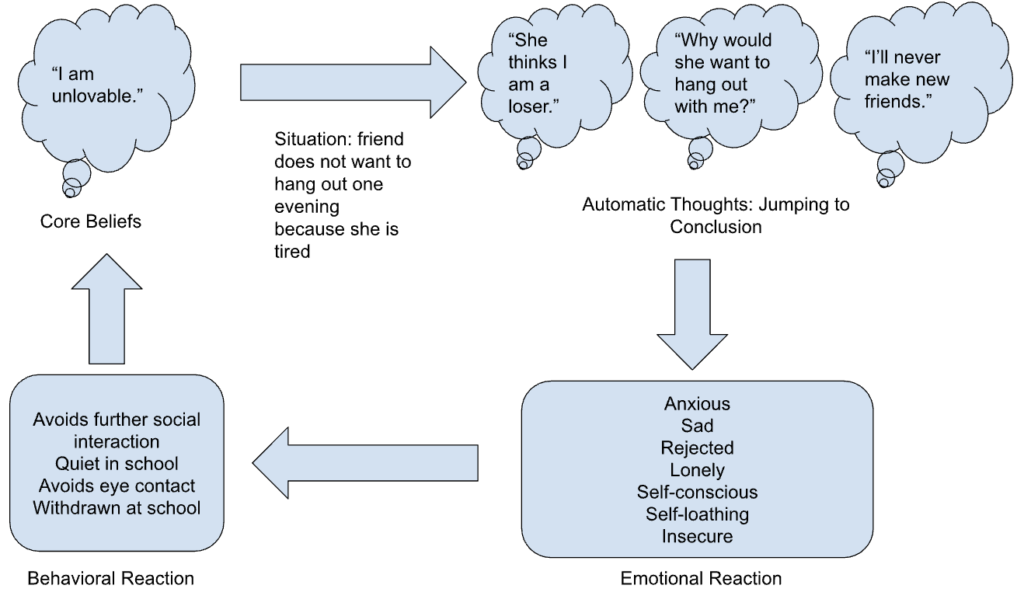
Even though we may think we have an accurate perception of the world we live in, we can fall into certain negative thought patterns, or cognitive distortions, which are incorrect and unrealistic ways of thinking about the world. Because thoughts have such a huge sway on our moods and emotions, we need to be mindful of how we think. One such thought pattern that we all have done, more often than others, is jumping to conclusions. These negative thought patterns are known to come from negative core beliefs we hold about ourselves and others.
Core Beliefs and our behaviors:
Core beliefs are a set of deeply buried assumptions that guides our behaviors. They are formed and influenced by our childhood experiences and it creates a perspective of how we see ourselves, how we see others, and how we see the world. Our core beliefs feels like the truth – our truth – and sometimes it is hard to change because our core beliefs often shape our perception of who we believe ourselves to be, and who we believe others to be.
An example of core beliefs at work, and how they can self-sabotage:
Cindy often receives harsh criticism from her parents growing up. Cindy’s core belief that has been etched into her since childhood is: “I am not good enough.” Therefore, when a situation occurs that impacts her negatively personally or professionally, her automatic thoughts include something along the lines of: “It is all my fault. I keep messing up. I am a failure.”
For example, Cindy recently broke up with her boyfriend of many years. She thinks to herself: “It is all my fault, and I will never find love again. I will be alone forever.” She is simply jumping to conclusions, but nevertheless, these thoughts make her feel depressed, withdrawn, and hopeless. Her behavioral reactions that follow these emotions involve not speaking with others, and not engaging in social interactions. She is sleeping less, and eating less, and has poor concentration at work and in daily tasks. Her negative thoughts about the situation did not come from nowhere – they came from her core belief that she is not “good enough.”
These automatic thoughts we described: “It is all my fault. I will never find love again. I will be alone forever” are examples of a very common cognitive distortion: jumping to conclusions.
How jumping to conclusions thinking can lead to depression and anxiety:
Jumping to conclusion thinking is a cognitive distortion where the person makes a negative interpretation of a situation that is unwarranted, based on limited information, and usually negative. This leads to the person having emotions and behavioral reactions in response to thoughts that are not based on facts. When these automatic thoughts are unwarranted and negative, this may lead to emotions such as depression, anxiety, rejection, and sadness.
There are two types of ‘jumping to conclusions’ thinking:
– Fortune telling: When you predict things will turn out badly.
– Mind reading: you automatically assume or conclude that someone is reacting or thinking negatively about you.
The core beliefs you hold about yourself and the resulting automatic thoughts can lead to self sabotaging behavior:

Example of Jumping to Conclusions thinking
For example, let’s say Camilla has grown up with very little affection or kind words from those around her. The core belief etched into her because of her upbringing is: “I am unlovable.” She starts a new school one day and starts to make some friendly acquaintances. One day, she asks a friend to go see a movie with her, but her friend declines the invitation because she is tired. Someone with a healthy core belief of oneself may simply think not much of it and brush it off. The automatic thoughts that come from unhealthy core beliefs may include negative ones where she jumps to conclusions based on very limited information: “She thinks I am a loser. Why would she want to hang out with me? I’ll never make new friends.”
These hasty conclusions can lead to Camilla feeling anxious, sad, rejected, self-conscious, insecure, and lonely. These emotions will likely lead to behaviors at school such as avoiding other students, being quiet and withdrawn at school, and avoiding interactions and eye contact with this potential friend.
These core beliefs and automatic thoughts, while they are not based on facts, have tremendous consequences on Camilla’s internal, emotional state and social life.
How to stop jumping to conclusions:
Let’s go back to our example of Camilla whose friend did not want to see a movie with her which then led Camilla to jump to the conclusion that she is a loser and that’s why nobody wants to hang out with her.
What are some strategies Camilla – and all of us – can use to stop making these anxiety-fueled, irrational conclusions?
Examine and challenge the conclusion
When we have these negative, anxiety-fueled thoughts entering our mind, we should challenge these conclusions that came to us and think about any other possible reasons for the situation. For example, Camilla could stop herself and say to herself: “My friend is probably tired from a long day of school” or “Perhaps she has a family obligation” or “Maybe she’s really worried about an exam.”
Consider the facts at hand:
When we have negative assumptions about people and the world around us entering into our brains, we should pause and think if we actually have all the evidence to even be able to draw this conclusion. Perhaps it would be helpful to write down these thoughts in a diary to help you recognize that there really isn’t much evidence to be drawing this conclusion.
Recall a time when your conclusion turned out to be wrong:
When you catch yourself thinking negative conclusions about yourself, others, or the world around you, perhaps try to pause and think about another time when you jumped to a conclusion that turned out to be wrong. Ask yourself perhaps if you are jumping to conclusions again.
How jumping to conclusions can sabotage our relationship with God:
We want to talk about how “jumping to conclusions” can sabotage our relationship with God.
As we mentioned before, our core beliefs can have a huge impact on our subsequent automatic thoughts, emotions, and behaviors. As Christians, not only do we have to examine core beliefs about ourselves, but also our core beliefs about the Gospel and about our faith:
– Do we really believe that we are beloved children of God?
– Do we really believe that God sent his only child to die for our sins?
– Do we really believe that our sins are really forgiven?
If our set of core beliefs about the Gospel is on a shaky foundation, then we as Christians are susceptible to intrusive, automatic thoughts that may come from Satan whose primary goal is to keep us separate from God.
When faced with difficulties and hardships in life, Christians whose core beliefs about the Gospel have not been examined, renewed, and solidified may find themselves succumbing to toxic, automatic thoughts and jump to conclusions:
“Why am I going through such a painful experience right now? I thought God was supposed to be watching me. Perhaps God does not exist.”
“Why is this happening to me? God must be punishing me.”
“Why is God allowing me to suffer? God wants me to suffer.”
These are the types of conclusions that Christians are in danger of jumping to when faced with profound difficulty in their lives, and for those who do not actively renew and nurture their core beliefs.
The Bible provides a profound example for us in the life of Job who had unshakeable faith in God – he really trusted God to his core. Job is described in the Bible as a blameless and upright man, who feared God and shunned evil. In fact, he was the greatest man among all the people of the East. One day, Satan decides to challenge God and says that Job is only a God-fearing man because God has blessed him. Satan then proceeds to take everything from Job that God had blessed him with to force Job to curse God with his lips. He takes everything from his livestock, to his servants, to his very own children.
Job 1: 1-22: At this, Job got up and tore his robe and shaved his head. Then he fell to the ground in worship 21 and said: “Naked I came from my mother’s womb, and naked I will depart. The LORD gave and the LORD has taken away; may the name of the LORD be praised.” In all this, Job did not sin by charging God with wrongdoing.
Despite losing everything – even his own children – Job does not sin by charging God with his hardship. Satan decides to go even further, inflicting Job with disease afflicting his entire body: (Job 2: 1-13):
Job 2: 1-13: So Satan went out from the presence of the LORD and afflicted Job with painful sores from the soles of his feet to the crown of his head. Then Job took a piece of broken pottery and scraped himself with it as he sat among the ashes. His wife said to him, “Are you still maintaining your integrity? Curse God and die!” He replied, “You are talking like a foolish woman. Shall we accept good from God, and not trouble?” In all this, Job did not sin in what he said.
Despite his wife and all his friends mocking Job’s faith and telling him to curse God, Job remains strong in his faith. At the end of Satan’s torment, God blesses his servant by doubling his wealth several fold, giving him another 10 children, and blessing him with another 140 years to his life. He also is a testament to the fact that God always has a plan for us even when things are profoundly difficult. Job’s story shows us that it is precisely when we are feeling doubt about God or about our core beliefs, we must seek to get closer to Him and renew our beliefs.
Enjoyed our blogpost? Subscribe to our newsletter for more resources on mental health and integrating the Gospel message in your healing journey.
If you found our resources useful, please consider donating to Oak Health Foundation, which is a 501(3)c nonprofit dedicated to providing resources regarding holistic mental healthcare and subsidized treatment for those in need.




